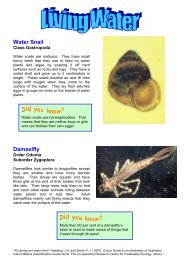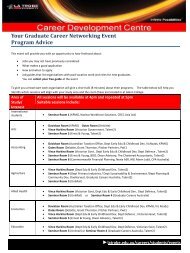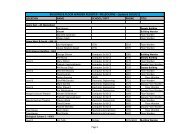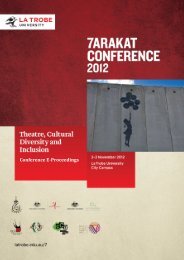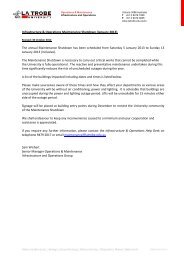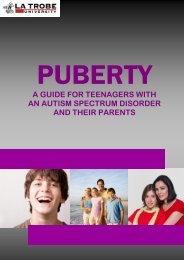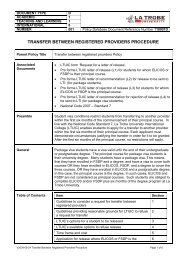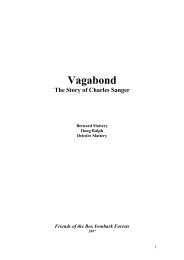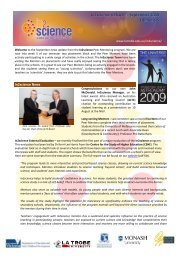Project Report - La Trobe University
Project Report - La Trobe University
Project Report - La Trobe University
Create successful ePaper yourself
Turn your PDF publications into a flip-book with our unique Google optimized e-Paper software.
eaches the village. It is the only village<br />
without electricity in the municipality,<br />
and a subsistence economy prevails.<br />
Mobile phone reception is temperamental<br />
and only from a few locations.<br />
We were introduced to Chananaw by a<br />
mutual friend one year ago. Both of us<br />
having learnt of many of the negative<br />
aspects of globalisation and the<br />
international development industry as<br />
part of our Social Science training, we<br />
quickly struck up a friendship with<br />
several members of the tribe who were<br />
keen to share with us their ideas and<br />
concerns regarding the Ichananaw’s<br />
increasing interaction with the outside<br />
world, as national and multinational<br />
corporations sit poised to extract natural<br />
resources from their lands, if only the<br />
tribe would consent. Our friends’ key<br />
concern is for development on the<br />
community’s own terms; life here could<br />
be improved in many respects but there is<br />
much they want to retain from the old<br />
ways.<br />
On our second visit, a tribal elder and<br />
friend, Daniel, invited us to live in<br />
Chananaw for one year to help them to<br />
document their ‘life system’ in order to<br />
pass it on to their future generations – a<br />
dream of his for many years. We said we’d<br />
love to in 2009 when Maria would finish<br />
her 11-month AYAD volunteer<br />
assignment (working at the Ateneo<br />
Center for Educational Development<br />
[ACED] in Manila to improve the quality<br />
of public education in the Philippines).<br />
Edwin decided to put his PhD in Sociology<br />
on hold to work on the project, having<br />
completed a year’s fieldwork in Manila.<br />
From the seed of Daniel’s initial<br />
invitation, we designed a five-month<br />
project to document the Ichananaw’s way<br />
of life and to develop ‘indigenised’<br />
educational materials for use in their local<br />
public school as the means for passing<br />
cultural heritage to the next generation.<br />
Indigenizing Education in a Kalinga Public School | 38<br />
Our twin goal is to improve the quality of<br />
education at the school through making<br />
education more culturally appropriate.<br />
This ties in nicely with current national<br />
education policy trends in the Philippines<br />
regarding education for indigenous<br />
peoples. For instance, the value of<br />
learning in one’s native language first,<br />
before having to learn the country’s two<br />
official languages (Filipino and English) is<br />
being promoted from several quarters<br />
and a bill for mother-tongue languages as<br />
the medium of instruction for the first<br />
three years of schooling is being<br />
considered by congress, to combat poor<br />
public educational outcomes across the<br />
Philippines.<br />
With the Dananao Elementary School<br />
(our host organisation), we managed to<br />
arrange support from VIDA for the<br />
project. We are also Honorary Research<br />
Fellows at <strong>La</strong> <strong>Trobe</strong> <strong>University</strong>’s<br />
Philippines Australia Studies Centre, and<br />
Edwin is a Research Affiliate of <strong>University</strong><br />
of the Philippines-Baguio’s Cordillera<br />
Studies Center, to support the research<br />
aspects of the project. Dananao<br />
Elementary School is also partnering with<br />
ACED for the development and<br />
publication of indigenised educational<br />
materials and ACED is applying to the<br />
Australian Government for a Direct Aid<br />
Program grant to cover publishing costs.<br />
So the project really cuts across<br />
education, development and academia,<br />
with the overall aim of meeting the<br />
community’s initial request.<br />
Another goal is to link the Ichananaw to<br />
local development organisations. Already,<br />
the school has become a partner school of<br />
ACED. Also, Cartwheel Foundation – a<br />
local NGO supporting education for<br />
remote indigenous communities – will be<br />
running its Music and Arts Program in<br />
Chananaw this May-June. Some of the<br />
stories and songs we gather are also likely<br />
to be included in a UNICEF Philippines<br />
publication to be used in childcare


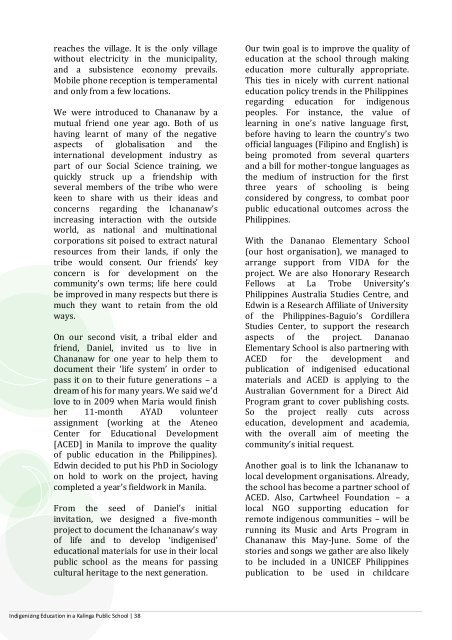
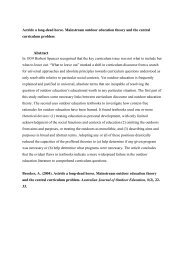
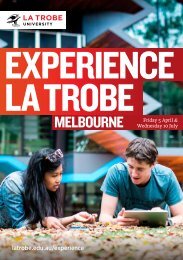
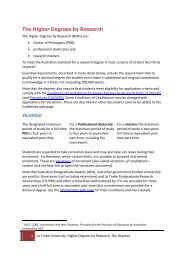
![Ottoman Empire course brochure [PDF 612KB] - La Trobe University](https://img.yumpu.com/12001562/1/184x260/ottoman-empire-course-brochure-pdf-612kb-la-trobe-university.jpg?quality=85)
![Getting Ready to Talk Manual [PDF 315KB] - La Trobe University](https://img.yumpu.com/11430807/1/190x245/getting-ready-to-talk-manual-pdf-315kb-la-trobe-university.jpg?quality=85)
